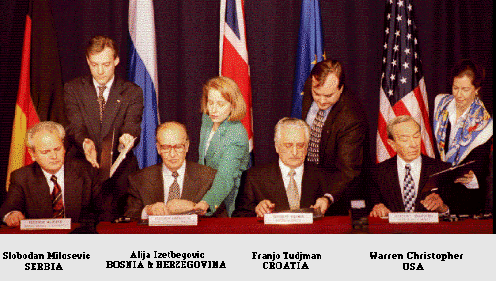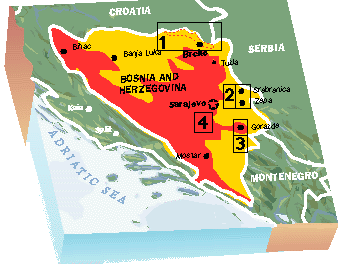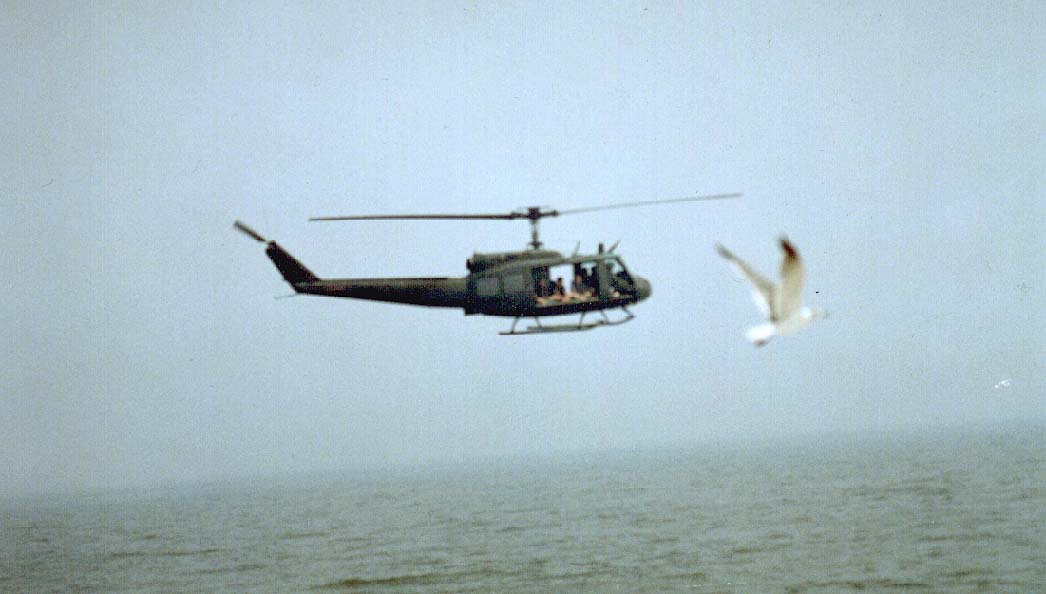Dayton Peace Accord

Re-assessment of Dayton Agreement by the HOUSE COMMITTEE ON INTERNATIONAL RELATIONS on July 25, 2001
Radical Proposal to Change Federal Structure of Bosnia-Hercegovina, by European Stability Initiative, January 8, 2004

Re-assessment of Dayton Agreement by the HOUSE COMMITTEE ON INTERNATIONAL RELATIONS on July 25, 2001
Radical Proposal to Change Federal Structure of Bosnia-Hercegovina, by European Stability Initiative, January 8, 2004
 Hey, visit Dayton Peace Agreement's Site on the Web, as it is officially done by the Department of State (alternate) or the one done earlier by Daytonites themselves. Did anybody else notice that the longest armistice in Bosnian-Serbian-Croatian war was in place while their leaders were locked
up in a foreign military base? How that nobody got that idea
earlier? Instead of courting them in Geneva, London, Paris, New
York five stars hotels and letting them wonder around free
whenever one of them has one of his tantrums... ...Wright-Patterson air-base in Dayton, Ohio seemed to be a perfect setting.
Maybe Americans should have kept them there.
Hey, visit Dayton Peace Agreement's Site on the Web, as it is officially done by the Department of State (alternate) or the one done earlier by Daytonites themselves. Did anybody else notice that the longest armistice in Bosnian-Serbian-Croatian war was in place while their leaders were locked
up in a foreign military base? How that nobody got that idea
earlier? Instead of courting them in Geneva, London, Paris, New
York five stars hotels and letting them wonder around free
whenever one of them has one of his tantrums... ...Wright-Patterson air-base in Dayton, Ohio seemed to be a perfect setting.
Maybe Americans should have kept them there.
 Will this peace agreement hold? Parts of the agreement that
regulate Bosnian-Croatian and Croatian-Serbian relations were
actually agreed upon earlier. Dayton just confirmed their
commitment to do so. It was the Bosnian-Serbian agreement
that's new. Both Izetbegovic and Milosevic shivered when Rabin
was shot, because it was essentially the same land-for-peace deal
they were about to sign. Would their extremists ever forgive
them? Milosevic gave up Eastern Slavonia, further conquest of
Bosnia, Gorazde in particular, but Alija gave up Banja Luka
region, Srebrenica and Zepa, Brcko corridor (which is actually
widened for Milosevic after Americans persuaded him by PowerScene that he has to agree on a larger corridor to Gorazde).
Will this peace agreement hold? Parts of the agreement that
regulate Bosnian-Croatian and Croatian-Serbian relations were
actually agreed upon earlier. Dayton just confirmed their
commitment to do so. It was the Bosnian-Serbian agreement
that's new. Both Izetbegovic and Milosevic shivered when Rabin
was shot, because it was essentially the same land-for-peace deal
they were about to sign. Would their extremists ever forgive
them? Milosevic gave up Eastern Slavonia, further conquest of
Bosnia, Gorazde in particular, but Alija gave up Banja Luka
region, Srebrenica and Zepa, Brcko corridor (which is actually
widened for Milosevic after Americans persuaded him by PowerScene that he has to agree on a larger corridor to Gorazde).
For many years Yugoslavia was proud as of its multiethnic character, of its ability to remain independent - it was even one of the key countries that started non-alignment movement. Its new nationalist leaders successfully destroyed both: ethnic grievances destructed possibility of multi-ethnic living for many years to come, and in those years fragile truce of what was once Yugoslavia will be kept by 60,000 foreign soldiers, coming from 60 countries. Click to see how the "Great Powers" divided Bosnia. Contact American troops in Bosnia.
 Many say the agreement actually acknowledged the existing division between Bosnian-Croat federation and the dark, strangely shaped Republika Srpska, which was won by war and the process of ethnic cleansing. Many say the U.S. sponsored Dayton agreement was not so much different from the Vance-Owen peace plan, which the U.S. vigorously opposed just two years ago, only that it was even worse for Bosnian Muslims, widely regarded as the principal victims of this war. Click here to see how Dayton and Vance-Owen compare. Click here to read the critique by a former member of Bosnian government.
Many say the agreement actually acknowledged the existing division between Bosnian-Croat federation and the dark, strangely shaped Republika Srpska, which was won by war and the process of ethnic cleansing. Many say the U.S. sponsored Dayton agreement was not so much different from the Vance-Owen peace plan, which the U.S. vigorously opposed just two years ago, only that it was even worse for Bosnian Muslims, widely regarded as the principal victims of this war. Click here to see how Dayton and Vance-Owen compare. Click here to read the critique by a former member of Bosnian government.
 Nevertheless, so far, Bosnia is cheering: Serbs, Bosnian Muslims, Croats -
everybody seems to feel great relief that Americans are finally
coming to take their little nasty war over from them. It is unlikely, I believe, that anybody would actually shoot Americans (three millions of land mines will present a problem, though, as we already witnessed). However, behind NATO's back we may expect that they'll all try to arm
themselves to their teeth while the truce lasts. Americans said
they'll provide weapons and training for Bosnian Muslims. That's
sure not going to float well with Serbs, or maybe even worse with
Croats. But Croats already got that, didn't they? Former
Pentagon officers trained them before the Krajina offensive. We'll
probably have a new-world-order old-cold-war adapted scheme
where now friends Americans arm Bosnian-Croat federation, and
Russians arm Serbs. This is great for business. I bet that both
countries military-industrial complexes are looking forward for
deals to come and save them from timely extinction.
Nevertheless, so far, Bosnia is cheering: Serbs, Bosnian Muslims, Croats -
everybody seems to feel great relief that Americans are finally
coming to take their little nasty war over from them. It is unlikely, I believe, that anybody would actually shoot Americans (three millions of land mines will present a problem, though, as we already witnessed). However, behind NATO's back we may expect that they'll all try to arm
themselves to their teeth while the truce lasts. Americans said
they'll provide weapons and training for Bosnian Muslims. That's
sure not going to float well with Serbs, or maybe even worse with
Croats. But Croats already got that, didn't they? Former
Pentagon officers trained them before the Krajina offensive. We'll
probably have a new-world-order old-cold-war adapted scheme
where now friends Americans arm Bosnian-Croat federation, and
Russians arm Serbs. This is great for business. I bet that both
countries military-industrial complexes are looking forward for
deals to come and save them from timely extinction.
Once the Americans (and others) leave, will Bosnians, Croats and Serbs revert to war, or will the power equilibrium hold them at bay? This is difficult to say now. It will definitively be interesting to see how Americans intend to do away (or do they?) with the obvious Bosnian vassalage to Croatia. It is also easy to see both Croatia and Serbia remaining highly militarized authoritarian societies, a far cry from "civil society" that pro-democracy groups in Yugoslavia in eighties hoped for. Democracy has been successfully cheated by the war. To try to prevent this to happen again, the U.S., after the elections in Bosnia on September 14, suggested another Dayton would be needed. Particularly, because the war criminals like Zeljko Mejakic still walk free.
 Pentagon set up a site (gopher) where you can find out how NATO troops are doing in Bosnia. How long will the American commitment last anyway? Who
knows? The history of America's relentless attempts to impose its
particular concept of order and stability throughout much of the
world, i.e. "to lead", is full of similar examples: Americans in this
century repeatedly tried to establish international organizations
which would put an end to warfare through legal proceedings like
arbitration - yet, then, due to opposition at home (suspicious
Congress, isolationist crowd...), they were reluctant to join the
efforts they initiated. American foreign policy is constantly in
pains between its moral ideals and the insatiable appetite for
leadership. Check here for the dictionary of Anerican and NATO military terminology to help you read the framework agreement documents. Meanwhile Clinton postponed returning of American troops from Bosnia indefinitely and Pentagon plans on establishing the U.S. military bases in Croatia (Zadar and Slavonski Brod). Croatia is all excited to become a part of the Partnership for Peace - regardless of costs - with (futile) hope that paying its way into military cooperation with the West it will qualify to become a peer in economic cooperation as well. The cost of NATO expansion for the U.S. taxpayer, depending on scope of the expansion, is projected by various institutions at a range anyway between $1.5 and $500 billions.
Pentagon set up a site (gopher) where you can find out how NATO troops are doing in Bosnia. How long will the American commitment last anyway? Who
knows? The history of America's relentless attempts to impose its
particular concept of order and stability throughout much of the
world, i.e. "to lead", is full of similar examples: Americans in this
century repeatedly tried to establish international organizations
which would put an end to warfare through legal proceedings like
arbitration - yet, then, due to opposition at home (suspicious
Congress, isolationist crowd...), they were reluctant to join the
efforts they initiated. American foreign policy is constantly in
pains between its moral ideals and the insatiable appetite for
leadership. Check here for the dictionary of Anerican and NATO military terminology to help you read the framework agreement documents. Meanwhile Clinton postponed returning of American troops from Bosnia indefinitely and Pentagon plans on establishing the U.S. military bases in Croatia (Zadar and Slavonski Brod). Croatia is all excited to become a part of the Partnership for Peace - regardless of costs - with (futile) hope that paying its way into military cooperation with the West it will qualify to become a peer in economic cooperation as well. The cost of NATO expansion for the U.S. taxpayer, depending on scope of the expansion, is projected by various institutions at a range anyway between $1.5 and $500 billions.

General Framework Agreement for Peace in Bosnia and Herzegovina
Return to the main page or look what a group dedicated to non-violence of Belgrade had to say about the treaty here.